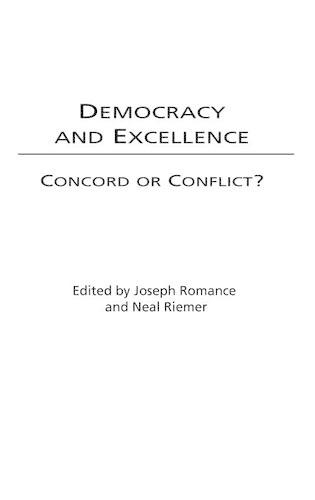
Democracy and Excellence: Concord or Conflict
(Hardback)
Publishing Details
Democracy and Excellence: Concord or Conflict
By (Author) Joseph Romance
Edited by Neal Riemer
Bloomsbury Publishing PLC
Praeger Publishers Inc
30th August 2005
United States
Classifications
General
Non Fiction
Political structures / systems: democracy
International relations
327.101
Physical Properties
Hardback
180
Description
Does democracy promote excellence Searching history, literature, and works of political theory, the contributors conclude that American democracy does indeed promote excellence despite thousands of years of political theory arguing the contrary. However, the promotion of such excellence requires one to think differently about what excellence means and how best to promote it. Religion and a strong sense of community are vital in creating this democratic excellence and are necessary to counter conservative critics who see little value in democratic practices. Entering the twenty-first century, this question has become all the more important. Democracy is a difficult and challenging form of government that is increasingly more common than it once was. As the United States works to promote democracy throughout the world it is a timely matter to consider once again why democracy is a good thing. At the same time, Romance and Riemer remind us always to think about and ponder the ways democracy can fail us. Contributions from distinguished scholars of political science, history, and religion provide supporting evidence in a multi-disciplinary approach.
Reviews
Neal Riemer was a prolific scholar who combined interests in democratic theory, religion, and ethics. Published after Riemer's death in 2001, this collection of essays by some of the top names in this field addresses the tension between democracy and excellence. The spirit of Tocqueville animates many of them, and Riemer, like Tocqueville himself, expresses reasonable optimism that with constant effort, these values may be reconciled. Glenn Tinder finds in Thucydides the lesson that although democracy can exist without excellence, excellence requires the existence of democracy. For Edward Long, the variety of religious practice renders it impossible objectively to define excellence in religion. Wilson Carey McWilliams explores the tension between democracy and excellence in Mark Twain's work. Patrick Deneen suggests that the ordinary virtues of democratic citizenship are more extraordinary than acts of valor that typically garner praise. Brett Gary resurrects the ideal of a competent democratic public that is not simply a victim of manipulation. Jeffrey Becker considers Franklin Roosevelt as an individual who embodied both of the values in question. Finally, Joseph Romance suggests that perhaps democracy should promote those homely virtues of toleration and acceptance over excellence, the lure of which may lead one astray. Highly recommended. General readers, upper-division undergraduates and higher. * Choice *
Reimer has been a leading proponent of reintroducing and revivifying the central role of democratic theory in American political discourse. His The Revival of Democratic Theory of 1962 is now a classic of its kind. In these eight articles contributors work through Reimer's ideas, including how one can define and achieve excellence in an egalitarian society. Their topics include reconciling democracy and excellence, Thucydides on democracy and chaos, equality and excellence in American religion, Mark Twain's political thought, ordinary virtue, the competent public, Tocqueville and Franklin Delano Roosevelt, and the dangerous allure of excellence. * Reference & Research Book News *
Author Bio
Joseph Romance is professor of Political Science at Drew University where he teaches American politics and political theory. He has an undergraduate degreee from the College of William and Mary and a Ph.D from Rutgers University. He is co-author of A Republic of Parties and The Challenge of Politics. His current research includes work on the American founding. The late Neal Riemer was the Andrew V. Stout Professor of Political Philosophy at Drew University. He received his Ph.D from Harvard University and taught at Pennsylvania State University and the University of Wisconsin. He published many works, including James Madison: Creating the American Constitution and Creative Breakthroughs in Politics.
